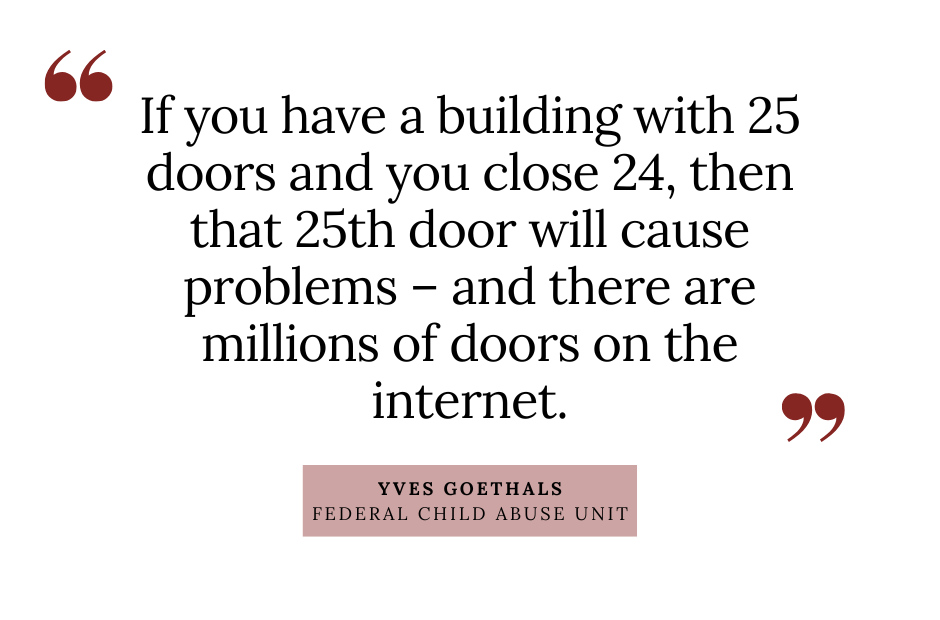Belgium is seeing a rising number of children posting sexual content of themselves online, according to the head of the federal child abuse unit, Yves Goethals. While online platforms routinely flag this content, the inefficiency of the process is a major barrier to tackling the issue.
Over the last few years, authorities have noticed more children between eight and 12 years old posting sexual images and videos of themselves on social media. "They don't know what they're doing [...] they think it's fun and they get some 'likes' from friends," Goethals explains.
While these minors are not considered criminals in the eyes of the law, publishing this content makes it easier for predators to find victims, Goethals warns. This content is also used as ammunition to abuse other minors. "These clips fall into the hands of child abusers who use them to convince other children to do the same," Goethals adds.
New tech, old problem
Online manipulation of minors gained international attention in February, following reports of a rise in online minor abuse cults. These networks prey on minors, typically between eight and 17 years old, and manipulate them into committing and sharing violent acts. These range from child sexual abuse or exploitation to even murder, according to European law enforcement agency Europol.
Though Goethals' unit is not currently aware of any Belgian victims, he says he is "not naive that it could be happening in Belgium."
He noted that while Europol's information only recently reached his team, the manipulation of minors in this way is nothing new. "Manipulating children has always happened," Goethals explains. "But years ago [abusers] just had the children around them and now they have the internet."
What's not working?
Tackling online child abuse requires an international effort. Currently, social media platforms – which are mostly hosted in the United States – flag potential abuse of minors to the National Centre for Missing & Exploited Children (NCMEC). The NCMEC then distributes this information to the authorities of the relevant countries.
In Europe, most reports first go through Europol. The agency then shares the information with the relevant European authorities after cross-referencing IP addresses or phone numbers.

Europol HQ in the Hague. Credit: Belga
Goethals believes this system could be made more efficient. "For example, we receive hundreds of clips of young women, 25 to 30 years old, dancing nude...but this is not illegal. The reporting should be more to the point and [they shouldn't] just send anything to us."
As well as sifting out legally irrelevant content, Goethals' unit has also had to deal with multiple reports of the same case. "I have received about 750 reports of the same picture from the same person." Not only does this waste time, it also distorts the statistics. "In total, it's 750 reports – but it's actually just one picture," he adds.
For Goethals, the solution requires more effort from social platforms. "They have the technology, the money and the means, so they need to find a solution," he says.
While the amount of online content swamps the resources available, Goethals maintains a pragmatic view to the issue. "There is not enough manpower to fight any criminal phenomenon," he says. "You have to accept this in society and you have to make the best of the resources you have. That's what we are doing."
'Millions of doors'
Goethals stresses that prevention is a key aspect of fighting minor abuse online. While he recognises the complexity of the topic, he believes parents have to have a significant role to play in communicating the dangers of online platforms.
In particular, legal guardians must be aware of the content to which they expose their children when they grant them access to social media. "If you teach your child to ride a bicycle, you won't send them alone to Rue de la Loi at rush hour."
Goethals concludes that there is a global commitment to improving the online safety of minors, although warns that no solutions are ever 100% effective. "If you have a building with 25 doors and you close 24, then that 25th door will cause problems – and there are millions of doors on the internet."
Yves Goethals leads a seven-member federal unit which supports local investigations throughout the country. According to Goethals, every local police force in Belgium has a team which tackles child abuse.

